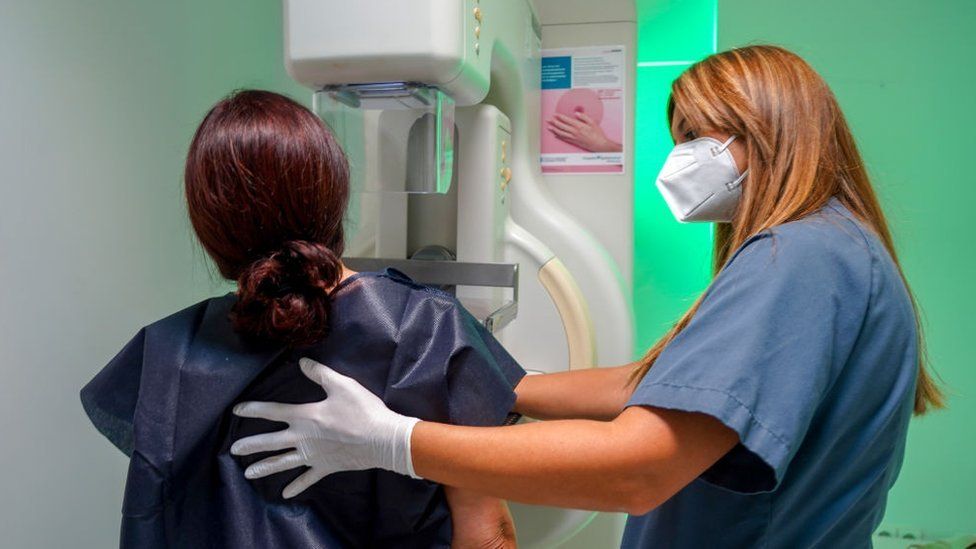ARTICLE AD BOX
 Image source, Getty Images
Image source, Getty Images
US medical experts recommend women begin screening every other year for breast cancer beginning at age 40.
By Chelsea Bailey
BBC News, Washington
A body of US medical experts is recommending women begin preventative breast cancer screening a decade earlier than under current guidelines.
They recommend preventative mammograms starting at age 40 with regular screenings every other year.
The draft guidelines from the US Preventive Services Task Force (USPS) are now under review.
Previous guidelines suggested most women start screening at age 50.
The task force - made up of doctors and disease experts who look at research on the best way to prevent diseases - said that, if adopted, the new recommendations could save the lives of an additional 19% of American women.
Breast cancer is the second most common cancer among US women, according to the Centers for Disease Control and Prevention, and nearly 13% of American women will be diagnosed with breast cancer at some point in their lifetimes.
The new screening guidelines are especially crucial for black women, who are "40% more likely to die from breast cancer than white women", the task force said on Tuesday.
"Ensuring Black women start screening at age 40 is an important first step, yet it is not enough to improve the health inequities we face related to breast cancer," Vice Chair Dr Wanda Nicholson said in a statement.
The new draft guidelines would apply to women who have an average risk for breast cancer, or a family history of the disease. It also includes women with other risk factors like dense breast tissue, a condition that can both increase the risk of cancer and make it harder to detect using mammograms.
The guidelines would not, however, apply to women who have a genetic risk of breast cancer, such as the BRCA1 genetic mutation.
An Indian start-up has designed a cheap, non-invasive breast cancer test
If adopted, the new recommendations set the US apart from countries like the UK and Canada, which recommend screenings begin at 50.
The UK's National Health Service (NHS) considers cancer risk for women under 50 to be "generally very low", according to Cancer Research UK, and women are invited to screen every three years.
In Canada, screenings are not recommended for women aged 40-49. Instead, mammograms are recommended for women aged 50-69 "every two to three years".
Breast cancer incidence in the United States has risen over the last four decades, according to a study published last October in the American Cancer Society Journal.
But death rates have fallen since their peak in 1989 thanks to advances in screening and treatment, the study found.
Women diagnosed with breast cancer in the US have a 90% survival rate, according to the National Cancer Institute.
But those survival rates shift dramatically if you are a minority in the US.
A recent study found that, compared to white women, minority women are more likely to be diagnosed with advanced-stage breast cancer.
The American College of Radiology has called for "earlier and more intensive" screening for high-risk women and called for women to have a breast cancer "risk assessment" by age 25 to determine if early preventative screening is needed.
"Our worry is that if now the USPS task force says (to screen at) 40 and every two years, we have concerns that's going to lead to even more disparities between whites and blacks in breast cancer diagnosis," said chair of the American College of Radiology Breast Imaging Commission, Dr Stamatia Destounis.
Black women in the US are 42% more likely to die of their breast cancer "despite pretty much equal incidence rates between whites and blacks" and are also much more likely to be diagnosed with later stage cancer, she said.
The US Preventative Services Task Force guidelines will now enter a period of public comment that will remain open until 5 June.

 1 year ago
127
1 year ago
127








 English (US) ·
English (US) ·